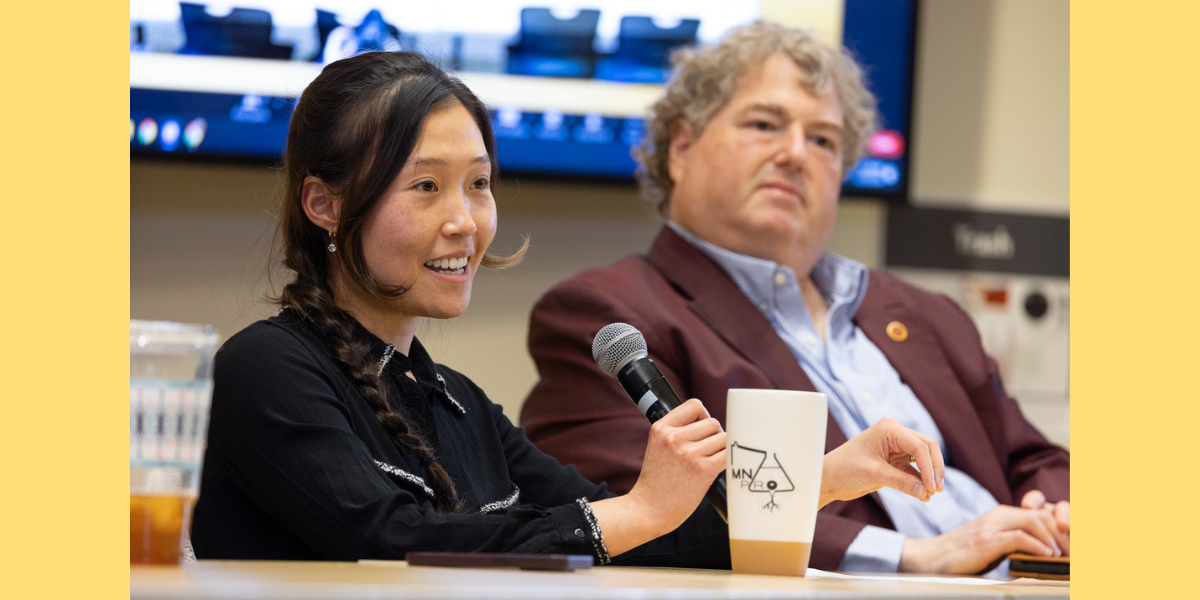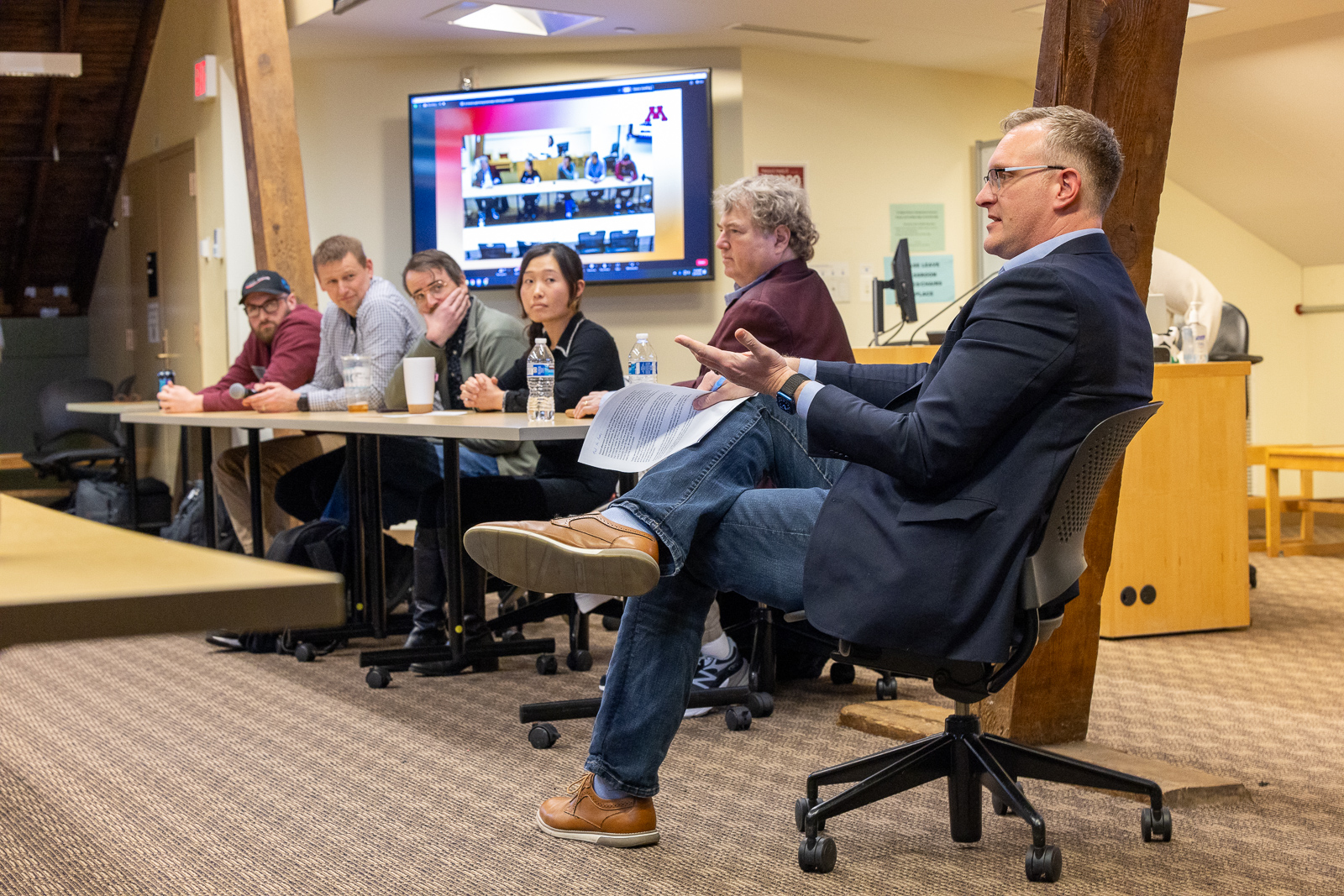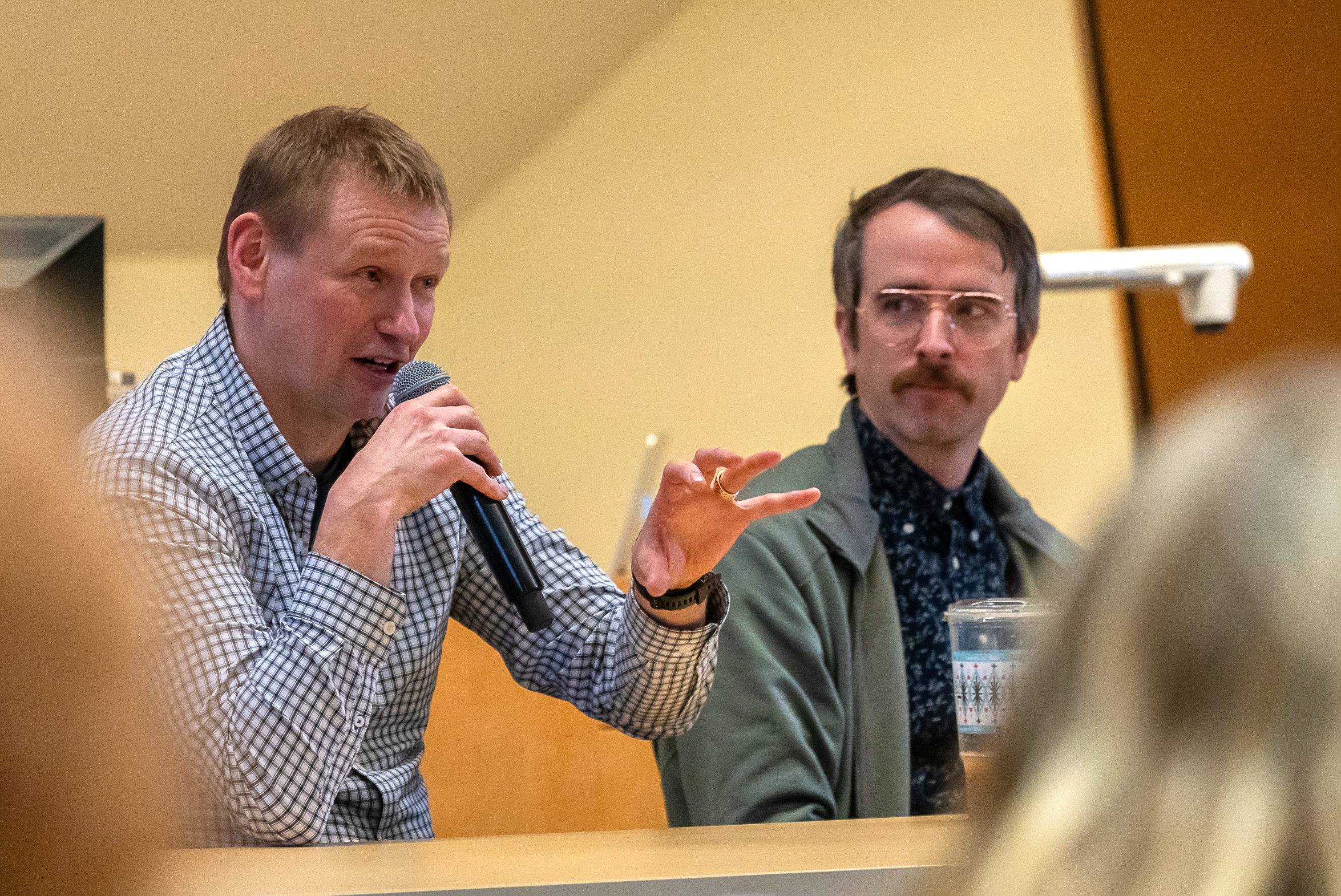Advancing into the unknown
Panel discusses opportunities and concerns surrounding ethical AI use in research

Panel discusses opportunities and concerns surrounding ethical AI use in research
Manci Li, a graduate student in the Comparative and Molecular Biosciences program at the College of Veterinary Medicine, answers a question from an audience member. Photo by Thomas Seiler.
As artificial intelligence (AI) infuses into more and more aspects of everyday life, questions continue to arise regarding its capabilities and the ethical considerations surrounding its use.
In the academic realm, researchers are exploring potential uses for the technology while taking stock of its limitations. As part of the University of Minnesota’s Research Ethics Day, the College of Veterinary Medicine’s (CVM) Office of the Associate Dean of Research hosted a panel discussion exploring the topic.
Moderated by Peter Larsen, assistant professor at CVM, the event titled “Research in an A.I. World: Balancing Innovation and Integrity” featured:
Consumers may be more familiar with AI being used to generate images, videos, and text, but one of the most common uses being tested in research is the performance of repetitive tasks involving large amounts of data. Whether it’s a photo or a dataset, panelists say any product of AI should be viewed with a discerning eye.

“I think AI is phenomenal at taking large amounts of data, munging them around, and coming up with something that just might be insightful and maybe even might be true,” Konstan says. “It's a lot like having a fleet of eighth graders doing research projects. You ask an eighth grader to do a research project. They dig into the first thing they find in the library, they find an answer, they write it down, and they don't necessarily understand how to tell if it is credible.”
Credible data and the findings they inform are vital to advancing knowledge through research, and panelists noted that larger conversations are taking place around how to cite the use of AI in research and what the ethical use of AI in research looks like. Concerns over copyrighted information being pulled in by AI to generate data and the presence of biases in data are just two ethical quandaries facing researchers.
Li, who uses AI in her research into neurodegenerative diseases, says the impact of the latter concern can be diminished through aspects such as study design.
“It's never possible to eliminate everything but we do our best to collect the data that's unbiased and used simply for the research that we're doing,” she says. “When we're trying to come up with data selection, we need to start with a data set with known positives and known negatives.”

While current AI technology is capable of pulling together and arranging data more quickly than a person, researchers attest that a human touch is still necessary when it comes to evaluating that data. For example, Cramer leads an effort to determine the feasibility of using AI to score the body condition of cattle on a production farm using photographs of the animals.
In one case, a misaligned picture that only showed part of a cow resulted in a data output that didn’t make sense. Upon reviewing the photo, it became clear that the technology was making up data instead of recognizing the partial photo as a lack of it.
“The technology doesn't know how to say, ‘I don't know,’ or ‘I need more data,” Cramer says.
Despite these clear limitations of AI, ChatGPT, the generative AI program that served as a panelist by being fed the same questions as the human speakers, offered some surprisingly insightful responses.
When the panel was asked, “How can AI help bridge the gap between research and veterinary services in underserved areas?” ChatGPT noted that AI could, “facilitate remote diagnostics and data-driven decision-making. To support this, essential infrastructure includes robust telecommunication networks, accessible digital platforms, and training programs for local veterinary professionals in AI applications.”
This response touched on several themes that the human panelists had also raised.
The possibilities of using AI in research seem endless, but the panelists agreed on the crucial importance of adequate training for researchers (and future researchers) on the responsible use of AI—which is no small task given the rapid and ever-evolving nature of the technology. Meeting the possibilities of the technology—and avoiding its pitfalls—will always require guidance and oversight from humans.
The “Research in an A.I. World: Balancing Innovation and Integrity” event kicked off CVM’s Research, Innovation, Discovery, and Education (RIDE) Seminar Series, which will offer a platform for cutting-edge exploration and discussion in the field of veterinary biomedical research. The series will bring engaging experts from diverse disciplines to present their latest findings, methodologies, and innovations to foster a dynamic exchange of ideas.
The RIDE Seminar Series is collaboratively organized by the CVM Office of the Associate Dean for Research and the CVM Research Committee.
Watch the full seminar below.